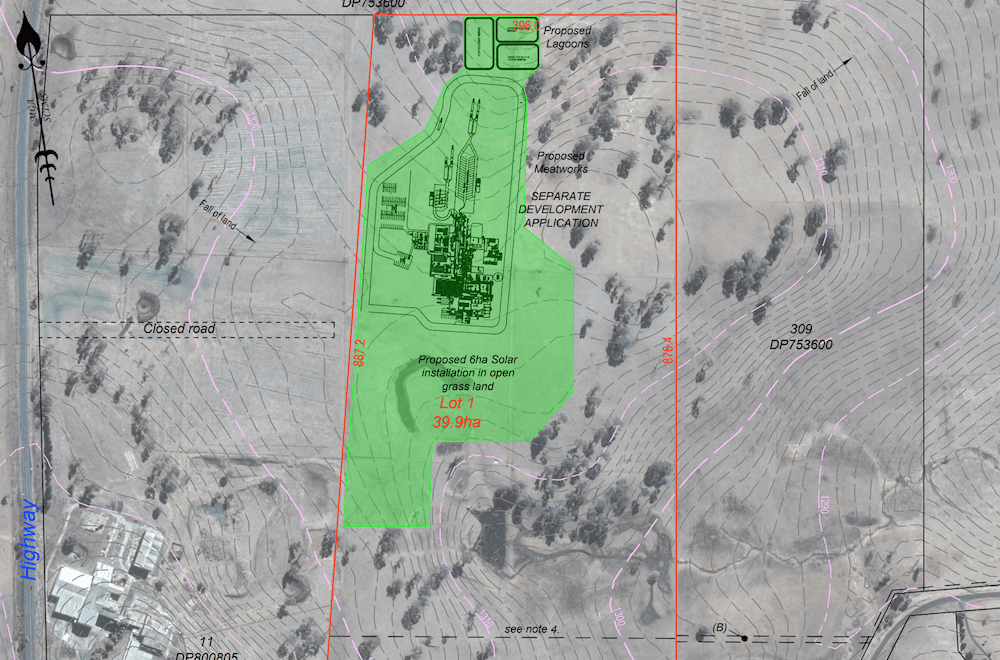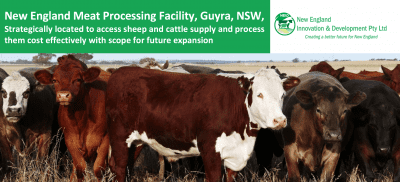IN May 2016 a group of six New England business people formed a new company to formally advance their plans to establish a meat processing facility in the Armidale-Guyra region, where an abattoir previously operated from the 1960s to 1990s.
Three years on, the group has self-funded the development of an advanced concept design, feasibility study and development application for an industrial subdivision and has secured a 71-hectare site of undeveloped industrial zoned land just off the New England Highway outside of Guyra.
The six directors of New England Innovation & Development Pty Ltd (NEID Pty Ltd) are local business owners and investors Rob Taber, Kathy Padgen, Christine Perrott and Shane Voigt, Tamworth solicitor Michael McHugh and Guyra farmer, land owner and developer Geoffrey Bell.
Their proposal is centred around establishing a multi-species meat processing facility to provide a localised custom toll processing for the large pool of premium quality livestock produced in the surrounding region, which contains an estimated 1-1.5 million head of predominantly Angus and Wagyu cattle and some six million sheep. The business also aims to develop its own premium New England brand with domestic and export supply chains
Existing meat processing facilities are located in Tamworth 112km away, where Teys Australia operates a beef plant and TFI operates a lamb plant, while Bindaree Beef operates an abattoir at Inverell 120km away.
The opportunity the developers have identified is to provide local access to toll processing capacity while also developing premium branded New England products for domestic and overseas markets, says Peter Bullock from Bullock Solutions, a private consultancy working with the project. Mr Bullock’s experience in the food processing sector includes nearly 20 years with Marel in Europe, UK and Australia and additionally with food industry project delivery company Wiley in Australia.
Mr Bullock said the closest toll processing facilities to the Guyra region are more than 250km away at Casino, Kempsey and Warwick. Limited available toll processing capacity meant some local producers and livestock traders sent stock as far as Victoria for processing.
“Small to medium producers find it difficult to get space at the right price,” he said.
“There are large numbers of livestock taken out of the region to be processed elsewhere because there isn’t the capacity here.”
New England Innovation & Development Pty Ltd has secured a site which neighbours the location of the former Guyra abattoir, which operated on and off from the 1960s through to the 1990s, in the latter years operated by AMH.
In addition to the multi-species abattoir it plans to build an additional industrial subdivision incorporating 31 industrial lots, which the proponents envisage becoming a future hub for food and agricultural businesses. As of September 2019, the development application for this subdivision is at an advanced stage.
According to current plans the abattoir would in its first year be able to process 2000 sheep per day and 250 cattle per day simultaneously on dedicated, segregated chains, Mr Bullock said, with longer term plans to double those numbers through an additional shift and a future proofed design.
The proposal also includes the potential for a solar farm for renewable energy creation which may be used either to support the power needs of the abattoir, the industrial subdivision or local existing businesses.
Mr Bullock said the proposal is designed to incorporate world’s best practice in automated processing and livestock handling, which, combined with reduced transport requirements for local livestock, would position the new facility as a leader in both animal welfare and meat-eating quality.
Shorter transport distances also mean lower livestock transport costs and this will provide a clear economic benefit for New England producers.
He said independent feasibility studies funded by the directors of NEID Pty Ltd were supportive of the economic feasibility of the plan and the economic benefits it would bring to the New England region.
The facility would initially run one shift per day for 224 days per year and employ 222 staff.
The proponents are in the process of completing development applications for local Council approvals and are developing applications for State approvals.
Construction costs are anticipated to be between AUS $70-$87 million, with annual operating costs of $28.6 million.
Operating the facility as a toll processor model was also seen as favourable for a start-up operation as no capital or cashflow was needed to be available for the procurement of livestock. However, the business model is being further developed to incorporate the creation of premium branded New England products for domestic and overseas markets.
Revenue streams would include meat processing, offal processing, rendering, cropping using treated wastewater and the sale of land in the industrial subdivision.
A fact sheet issued in September 2019 supporting the proposal says it is anticipated the project will be funded through a combination of seed funding, venture capital, private equity and debt funding, with shares distributed by negotiation where appropriate. Early stage discussions are now underway with the investment community.



HAVE YOUR SAY